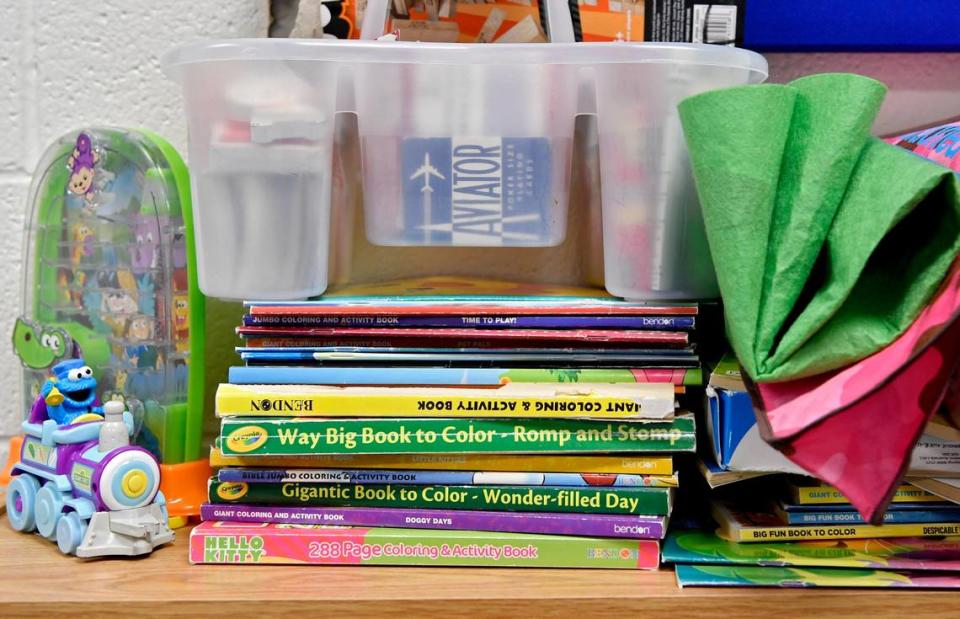Centre County jail holds firm on no-contact policy despite calls for change from advocates
- Oops!Something went wrong.Please try again later.
In our Reality Check stories, CDT journalists dig deeper into questions over facts, consequences and accountability. Read more. Story idea? cdtnewstips@centredaily.com.
The Centre County Correctional Facility has a longstanding policy that does not allow inmates to have physical contact with guests during general visits, including children, and the top decision-maker at the jail said he doesn’t expect that to change.
Criminal justice reform advocates, who have also pushed for outdoor recreation at the jail, expressed disappointment that what they view as progress remains stuck in neutral.
Pennsylvania Prison Society Family and Community Support Director Kirstin Cornnell said the independent jail and prison monitoring organization believes strongly in the “power of family connection.”
“It helps the mental health of the incarcerated person, the mental health of the family members on the outside. There’s lots of literature and research that shows how it improves the overall success of somebody when they come home, which just makes logical sense as well,” Cornnell said. “I think the benefits far outweigh some of the concerns. We want to think creatively with our county facilities and state facilities to do what we can to safely increase opportunities for people to have that connection and support.”
Visits without contact are the norm at county jails in Pennsylvania, where people rarely spend more than 23 1/2 months behind bars. Of the 41 jails that responded to the Prison Society’s most recent survey, only two said they allow contact visits — neighboring Blair County and Allegheny County.
Meanwhile, state prisons — where people are sent to serve longer sentences — offer contact visits as the default unless the privilege is lost.
Centre County’s policy has been in place since the jail opened in 2005. The design of the lockup, Warden Glenn Irwin wrote in an email to the Centre Daily Times, was “set up for and continues to be that general visits are non-contact.”
It marks at least the second time criminal justice reform advocates have expressed criticism about the jail’s design. They’ve also led a push to study the feasibility of outdoor recreation for inmates that have few opportunities to get outside.
Nearly as limited are the chances for incarcerated parents to have contact visits with their children. They must either complete a 24-hour parenting program or have a visit arranged by Centre County Children and Youth Services.
Central Pennsylvania United Director Jenna Henry said that left her and other former inmates scratching their head.
“It was like, ‘Oh, OK. So now I’m being punished because I wasn’t bad enough that CYS was involved.’ It’s such a weird thing,” the leader of the political organization that advocates for Democrats to be elected said. “If things were bad enough that CYS has an open case with you, then you can have a contact visit. But if things weren’t that bad to get to that point then you’re not allowed.”
Henry, who was raised by drug-addicted, incarcerated parents, is among those who were separated from their child by a pane of glass when she served time at the facility. Conversations were carried out by telephone.
Her time in the jail included a Christmas holiday, which she said was “excruciating as a parent.”
“That’s one thing that really, really sticks with me from my time of incarceration,” Henry said. “I wasn’t there super long, but that’s one thing that always sticks with me — what it was actually like to have to talk to my son on a phone through a piece of glass on Christmas.”
Irwin, like other county jail wardens, said contact visits can give people an opportunity to smuggle drugs, weapons and other illegal items into the facility. The jail, he said, holds security “in the highest regard.”
He did not directly answer a question that asked if he viewed it as feasible or legal to adopt the approach carried out by state prisons.
“For safety and security for all involved, we don’t discuss or disclose the security operations at the Facility,” Irwin wrote.
Cornnell, with the prison society, said jails rarely tell the public how much contraband is smuggled into the facility, especially through contact visits.
She advocated for jails to find less restrictive ways to prevent contraband being smuggled into the facility rather than blanket visitation restrictions.
“It’s one of those things that we’re always curious (about): Are these mechanisms in search of a problem?” Cornnell said. “I don’t think family visits are the No. 1 way contraband is getting into the facilities. I just haven’t seen the numbers or data from anybody to back that up.”
About 60% of the Centre County residents who were incarcerated at the jail in March had not yet been sentenced, according to the most recently available report delivered at the board of prison inspectors meeting.
It was not immediately clear how many, but some have not been convicted of a crime. At the least, Henry said, she’s hopeful the jail will allow people to have more contact visits with their children.
“It just seems absolutely insane to me that they have this contact visit room that’s already set up for people to have visits with their kids, but then the vast majority of the people in there can’t actually utilize it,” Henry said.


